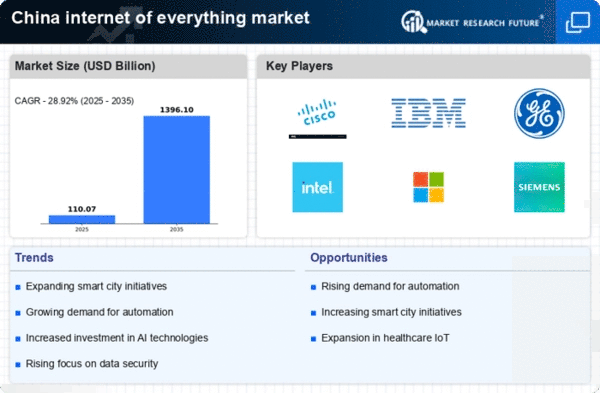Advancements in 5G Technology
The rollout of 5G technology in China is transforming the landscape of the internet of-everything market. With its high-speed connectivity and low latency, 5G enables a vast array of IoT applications, from autonomous vehicles to smart manufacturing. As of November 2025, China has established over 1 million 5G base stations, facilitating the connection of billions of devices. This technological advancement is expected to drive a surge in IoT adoption across various sectors, including healthcare, agriculture, and logistics. The enhanced capabilities of 5G are likely to foster innovation and create new business models, further stimulating growth in the internet of-everything market.
Increased Investment in IoT Startups
Investment in IoT startups in China is witnessing a significant uptick, serving as a crucial driver for the internet of-everything market. Venture capital funding for IoT-related companies has surged, with investments reaching approximately $10 billion in 2025. This influx of capital is fostering innovation and accelerating the development of new IoT solutions. Startups are focusing on niche applications, such as smart home devices, industrial IoT, and health monitoring systems. The competitive landscape is evolving, as established companies collaborate with startups to enhance their IoT offerings. This dynamic investment environment is likely to propel the internet of-everything market to new heights.
Rising Urbanization and Smart Cities
The rapid urbanization in China is a pivotal driver for the internet of-everything market. As urban populations swell, cities are increasingly adopting smart technologies to enhance infrastructure and services. The Chinese government has initiated numerous smart city projects, aiming to integrate IoT solutions for traffic management, energy efficiency, and public safety. By 2025, it is projected that over 500 cities in China will implement smart city initiatives, potentially increasing the demand for IoT devices and services. This urban shift not only improves the quality of life for residents but also creates a robust market for IoT solutions, thereby propelling the internet of-everything market forward.
Growing Consumer Demand for Smart Devices
Consumer demand for smart devices in China is rapidly increasing, significantly impacting the internet of-everything market. As of November 2025, it is estimated that over 300 million smart home devices are in use across the country. This surge in consumer interest is driven by the desire for convenience, energy efficiency, and enhanced security. Major technology companies are responding by expanding their product lines to include a variety of IoT-enabled devices, from smart speakers to connected appliances. This growing consumer base is likely to create a robust ecosystem for the internet of-everything market, fostering further innovation and adoption.
Focus on Sustainable Development Initiatives
Sustainability is becoming a central theme in China's development strategy, influencing the internet of-everything market. The government is promoting green technologies and sustainable practices, encouraging industries to adopt IoT solutions for energy management and resource optimization. By 2025, it is anticipated that IoT applications in energy efficiency could reduce energy consumption by up to 20% in major sectors. This focus on sustainability not only aligns with global environmental goals but also drives the demand for IoT technologies that support smart grids, waste management, and sustainable agriculture. Consequently, the internet of-everything market is likely to benefit from this shift towards greener practices.
















